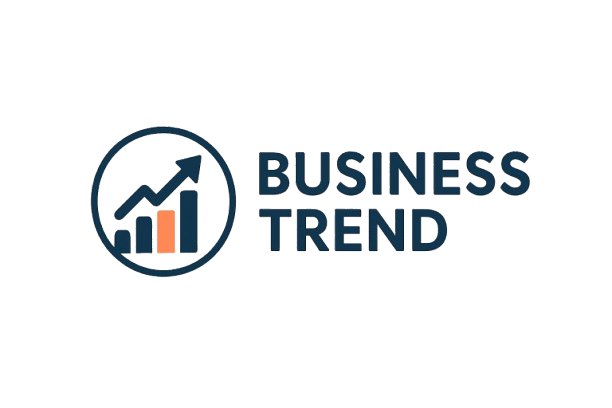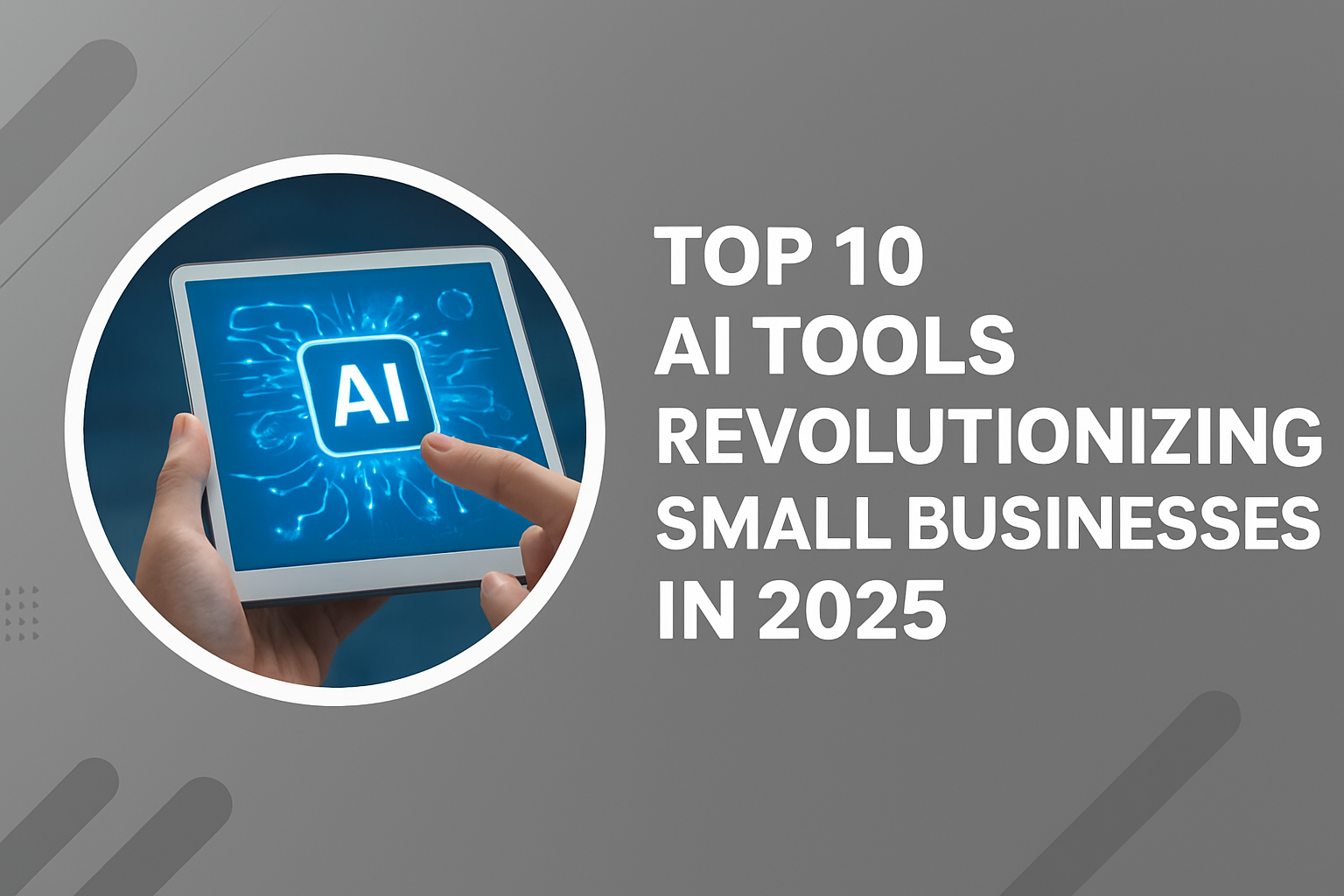Introduction
Artificial intelligence (AI) has become a game-changer for small businesses. What was once considered high-tech and expensive is now accessible, affordable, and practical for businesses of all sizes. In 2025, AI tools are not just a luxury they are a necessity for staying competitive in an increasingly digital marketplace.
From automating repetitive tasks to analyzing customer data, AI enhances efficiency, improves decision-making, and drives business growth. Small business owners who leverage these tools gain a significant edge over competitors who rely solely on traditional methods.
This article explores the top 10 AI tools revolutionizing small businesses in 2025, helping entrepreneurs streamline operations, boost productivity, and deliver superior customer experiences.
1. AI-Powered Customer Support Tools
Customer support is one of the most time-consuming aspects of running a small business. AI-powered chatbots and virtual assistants handle inquiries efficiently, providing 24/7 support without the need for a full-time team.
Tools like Zendesk AI, Tidio, and Freshdesk AI allow businesses to:
-
Respond instantly to FAQs and common customer issues.
-
Route complex queries to human agents seamlessly.
This not only improves response times but also frees your team to focus on higher-value tasks, ensuring better customer satisfaction.
2. Marketing Automation and Personalization
AI marketing tools have revolutionized how small businesses reach their audience. By analyzing customer data, these platforms enable personalized campaigns that drive engagement and conversions.
Popular AI marketing tools:
-
HubSpot AI – Automates email campaigns and lead nurturing.
-
Mailchimp AI – Optimizes send times and content for higher engagement.
Benefits include:
-
Targeting the right customers at the right time.
-
Reducing manual effort in campaign management.
-
Increasing ROI through data-driven insights.
3. Predictive Analytics Tools
Predictive analytics uses AI to forecast trends, customer behavior, and potential business outcomes. Small businesses can use these insights to make informed decisions, optimize operations, and reduce risk.
Examples of predictive analytics tools:
-
Tableau with AI integration – Visualizes data trends and predicts sales.
-
Zoho Analytics AI – Helps identify patterns in customer behavior and revenue streams.
By leveraging predictive analytics, businesses can anticipate demand, adjust marketing strategies, and improve overall efficiency.
4. AI Tools for Financial Management
Managing finances is a critical challenge for small businesses. AI-driven finance tools automate accounting, track expenses, and forecast cash flow, reducing errors and saving time.
Key AI finance tools:
-
QuickBooks with AI – Automates bookkeeping and generates financial reports.
-
Xero AI – Offers predictive cash flow insights and expense tracking.
Using AI in finance ensures accurate decision-making and helps maintain financial stability, which is vital for growth and scalability.
5. AI Content Creation Tools
Creating consistent, high-quality content is essential for brand visibility. AI content tools assist small businesses by generating blogs, social media posts, ad copy, and even email templates.
Popular AI content platforms:
-
Jasper AI – Generates professional marketing content quickly.
-
Copy.ai – Helps create persuasive copy tailored to your audience.
Benefits of AI content tools:
-
Saves time on writing and editing.
-
Ensures brand messaging remains consistent.
-
Provides data-driven suggestions to optimize engagement.
6. AI Design Assistants
Visual content is crucial for marketing, and AI design tools simplify the process. They help create logos, social media graphics, and marketing materials without extensive design experience.
Recommended AI design tools:
-
Canva Magic Design – Suggests layouts, fonts, and color schemes.
-
Looka – Generates logos and branding assets based on your preferences.
These tools save time, reduce costs, and allow even small businesses to maintain professional branding standards.
7. AI-Powered E-commerce Tools
For small businesses selling online, AI can enhance the shopping experience and boost sales. AI tools analyze customer behavior, suggest products, and optimize pricing strategies.
Key AI e-commerce tools:
-
Shopify AI – Recommends products and predicts trends for online stores.
-
Klevu – Improves search functionality and personalization on e-commerce websites.
Benefits include:
-
Higher conversion rates.
-
Personalized shopping experiences.
-
Reduced cart abandonment through predictive suggestions.
8. AI for Social Media Management
Social media is a vital marketing channel, but managing multiple platforms can be overwhelming. AI tools streamline social media posting, engagement, and analytics.
Popular AI social media tools:
-
Buffer AI – Suggests content and optimal posting times.
-
Lately AI – Generates social posts from long-form content automatically.
Using AI ensures consistent online presence, increases engagement, and saves time for small teams.
9. AI-Powered CRM Systems
Customer Relationship Management (CRM) is central to business growth. AI-integrated CRM systems provide predictive insights, automate follow-ups, and identify high-potential leads.
Examples of AI CRM tools:
-
Salesforce Einstein – Uses AI to score leads and recommend next actions.
-
Pipedrive AI – Suggests optimal sales strategies and follow-up schedules.
These tools help small businesses maintain stronger relationships with customers and improve conversion rates efficiently.
10. AI Security and Fraud Detection Tools
As digital operations increase, so does the risk of cyber threats. AI security tools monitor activity in real-time, detect anomalies, and prevent fraud before it affects your business.
Top AI security tools:
-
Darktrace – Provides real-time cyber threat detection and alerts.
-
Kount – Uses AI to prevent payment fraud and suspicious transactions.
Investing in AI security safeguards your business and builds customer trust, which is essential for long-term success.
11. Integrating AI Into Your Business Workflow
While each AI tool offers specific benefits, integrating them effectively ensures maximum efficiency. Start by evaluating your business needs, choosing the right tools, and training your team to use them efficiently.
Steps for integration:
-
Identify repetitive or time-consuming tasks that AI can automate.
-
Select tools that complement each other and your existing systems.
-
Monitor performance and adjust workflows as needed.
Integration ensures AI becomes a seamless part of daily operations, amplifying productivity rather than adding complexity.
12. Common Pitfalls to Avoid with AI Tools
While AI provides tremendous advantages, improper use can lead to wasted resources or poor results.
Common mistakes to avoid:
-
Over-reliance on AI without human oversight.
-
Choosing tools that don’t align with your business goals.
-
Ignoring data privacy and security regulations.
Balanced implementation, combined with human decision-making, maximizes AI’s benefits and minimizes risks.
13. Preparing for the Future With AI
The AI landscape will continue to evolve, offering more advanced and specialized tools. Small businesses that stay updated and experiment with new technologies will maintain a competitive edge.
Future trends include:
-
Voice-assisted business tools.
-
Predictive AI for inventory and logistics.
-
AI-driven customer experience personalization at scale.
Businesses that embrace AI early will be better equipped to scale operations, improve efficiency, and enhance customer satisfaction.
Conclusion
AI tools are no longer just futuristic concepts—they are practical, accessible solutions that can revolutionize small businesses in 2025. From customer support and marketing to analytics, e-commerce, and security, AI improves efficiency, accuracy, and growth potential.
The key to success is choosing the right tools, integrating them effectively, and maintaining a balance between automation and human oversight. By embracing AI, small businesses can future-proof operations, enhance competitiveness, and create lasting value for customers.
Artificial intelligence is not replacing entrepreneurs—it’s empowering them to achieve more, faster, and smarter. Small business owners who harness this potential today will lead their industries tomorrow.


